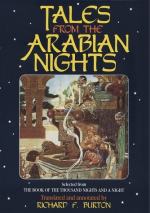of Lane and Habicht and Torrens and Von Hammer represented
but imperfectly the great corpus of Eastern folk-lore
which Captain Burton has undertaken to render into
English, without regard to the susceptibilities of
those who, not having bought the book, are, therefore,
in no way concerned in what is the affair of him and
his subscribers. The best part of two centuries
have passed away since Antoine Galland first turned
some of the tales into French, and got stigmatised
as a forger for his pains. Never was there such
a sensation as when he printed his translations.
For weeks he had been pestered by troops of roysterers
rousing him out of bed, and refusing to go until the
shivering Professor recited one of the Arab stories
to the crowd under his window. Nor has the interest
in them in any way abated. Thousands of copies
pass every year into circulation, and any one who
has ever stood in the circle around the professional
storyteller of the East must have noticed how often
he draws on this deathless collection. The camel-driver
listens to them as eagerly as did his predecessors
ages ago. The Badawi laughs in spite of himself,
though next moment he ejaculates a startling “Astaghfaru’llah”
for listening to the light mention of the sex whose
name is never heard amongst the Nobility of the Desert.
Or if the traveller is a scholar and a gentleman, he
will pull out his book for amusement of the company
squatted round the camp fire, as did Captain Burton
many a time and oft in the course of his Eastern wanderings.
To Captain Burton the preparation of these volumes
must have been a labour of love. He began them
in conjunction with his friend Steinhaeuser, soon after
his return from the Mecca pilgrimage, more than thirty
years ago, and he has been doing something to them
ever since. In the swampy jungles of West Africa
a tale or two has been turned into English, or a poem
has been versified during the tedium of official life
in the dank climate of Brazil. From Sind to Trieste
the manuscript has formed part and parcel of his baggage
and though, in the interval, the learned author has
added many a volume to the shelf-full which he has
written, the “Thousand Nights and a Night”
have never been forgotten. And now when he nears
the end of his labours it seems as if we had never
before known what the beauteous Shahrazad told the
King who believed not in the constancy of women.
Captain Burton seems the one sober man among drunkards.
We have all the old company though they appear in dresses
so entirely new that one scans the lines again and
again before the likeness is quite recognised.
However, Tajal-Mulook will no doubt be as knightly
as ever when his turn comes, for the Barber is garrulous,
after the old fashion, and the three Shaykhs relate
their experiences with the Jinns, the gazelles, and
mules as vividly as they have done any time these thousand
years or more. King Yoonan and the Sage Dooban
are here, and so are King Sindibad and his falcon,




